- Home
- Rosamunde Pilcher
Coming Home Page 11
Coming Home Read online
Page 11
PS Judith's Christmas present from you has still not arrived. I have instructed Mrs Southey at the Penmarron Post Office to forward it to St Ursula's when it does finally turn up.
Once more she read the letter through, then folded it, put it in an envelope, sealed and addressed it. It was done. She sat and listened to the rising wind outside, which thumped and whined at the window beyond the drawn curtain. It sounded as though a storm was blowing up. The small desk lay in a pool of light from the lamp which stood upon it, but behind her the bedroom was dim and quiet. In one of the twin beds Jess slept, Golly pressed to her cheek. Molly stood up and went to kiss her, and adjust the covers. Then she moved to the mirror over the dressing-table to touch her hair, and alter a little the drape of the silk scarf which she had knotted around her shoulders. Her pale reflection floated, like a wraith, in the dark glass. She went from the room, closing the door gently behind her. She crossed the landing, started down the stairs.
Windyridge, she had long decided, was a house which fell uncomfortably between two stools. Built just after the First World War, it was neither modern enough for convenience, nor old enough for charm, and its position, on the top of the hill above the golf course, ensured that it stood in the path of every wind that blew. But its most unhappy feature was the sitting-room, which the architect, suffering, Molly could only imagine, from an unfortunate rush of blood to the head, had designed as a lounge/hall, so that the staircase descended, and the front door opened, into it. This arrangement ensured both howling draughts and a sensation of impermanence, rather like sitting in a railway waiting-room.
However, Louise was there, ensconced in her easy chair by a roaring coal-fire, with her cigarettes and her whisky and soda conveniently to hand, and her knitting on the go. She was making shooting stockings. She was always making shooting stockings. When a pair was finished, she laid it in a drawer, ready for the next Church Sale, or Bring and Buy, and started again, casting on the next pair. She called it organised fidgeting, and clocked up her industry to Good Works.
Hearing Molly's step on the stair, she glanced up.
‘Ah, there you are! Thought you'd lost yourself.’
‘I'm sorry. I was writing to Bruce.’
‘Jess asleep?’
‘Yes. Fast.’
‘Have a drink. Help yourself.’
A loaded tray stood at the side of the room, stacked with bottles, clean glasses, and a siphon of soda. It was a masculine touch, smacking of the memory of Jack Forrester, but then nothing had been changed since his death. His gold trophies still decorated the mantelpiece, his regimental photographs, going back to India, hung on the walls, and everywhere were evidences of the hunt and the chase — the elephant's foot, the tiger-skin rugs, the horns of defunct deer.
Molly poured herself a small sherry and went to sit in the chair on the other side of the hearth. Louise stopped knitting and reached out her hand for her whisky. ‘Cheers,’ she said and took a mouthful. She laid down the glass and looked at Molly over her spectacles. ‘You don't look too cheerful.’
‘I'm all right.’
‘Bit of a wrench for you, leaving Judith, I can see that. Never mind. Time heals. You'll get over it.’
‘I suppose so,’ Molly said faintly.
‘At least it's behind you now. All over. It's done.’
‘Yes. It's done.’ She thought about it. ‘I suppose…’
But she got no further. A sound caught her attention, from out of doors, over the whine of the wind. A footstep, crunching on the gravel.
‘There's somebody outside.’
‘That'll be Billy Fawcett. Asked him over for a snifter. Thought it'd cheer us up.’
The front door opened, and a gust of cold air poured in upon them, causing rugs to flap and a cloud of sooty smoke to belch forth from the fireplace.
Louise raised her voice. ‘Billy, you old fool, close the door.’ It was slammed shut. The rugs stilled, the fire composed itself. ‘What a night to be out. Come along in.’
Molly was both taken aback and irritated by this untimely and unexplained intrusion. The last thing she wanted, at this moment, was company. She did not feel like making conversation with strangers, and felt it unperceptive of Louise to invite her friend over on this of all evenings. However, there was nothing to be done about it, and so, with a sinking heart, she laid down her sherry glass, arranged her features into a pleasant expression, and turned in her chair to greet the visitor.
Louise raised her voice. ‘Good of you to come, Billy!’
He did not immediately appear, because he was, presumably, taking off his overcoat and hat. But when he finally made his entrance, rubbing his hands against the cold, it was with the air of a man bestowing kindly favours.
‘Here I am, my dear, battered by the tempest.’
He was not tall, but wirily built, and wore a plus-four suit of large and loud checks. The plus-fours were particularly voluminous, and emerging from their ample folds his skinny calves, in bright-yellow knitted stockings, resembled the legs of a bird. Molly wondered if Louise had knitted the stockings, and if so, which of them had chosen the colour. His hair was white, thinning over a leathery scalp, and his cheeks were netted with red veins. He sported a Regimental tie, a brisk moustache, and a merry twinkle in his light-blue eyes. She guessed his age to be around fifty.
‘Molly, this is my neighbour, Billy Fawcett. Or Colonel Fawcett, if you wish to be formal. Billy, this is my sister-in-law, Molly Dunbar.’
She put a smile on her face, held out her hand, and said, ‘How do you do,’ expecting him to shake it. But he grasped her fingers and bowed low. For a mad moment she thought he was going to kiss it, and very nearly snatched her hand away. But he was just being excessively courtly.
‘Delighted to meet you…heard so much about you,’ he added, that rider which is guaranteed to freeze spontaneous conversation.
But Louise, abandoning her knitting and rising from her chair, took over. ‘Take a pew, Billy. After your efforts, you'll need a whisky and splash.’
‘Won't say no.’ He did not, however, sit down, but went to stand in front of the fire, slapping his thighs, and causing his baggy tweeds to steam slightly; and emanate a faint smell of old bonfires.
Molly resettled herself in her chair and reached for her sherry. Billy Fawcett smiled engagingly down at her. His teeth were even and yellow, rather like those of a healthy horse.
‘You've been having a bit of a time, I hear, getting your house in order before you go back East.’
‘Yes. We're birds of passage now. Louise has very kindly let us come here for a couple of nights before we set off on our journeys.’
‘I must say I envy you. Wouldn't mind a spot of the old sun again. Oh, thank you, Louise my dear, just the ticket.’
‘You'd better sit down, Billy. Your trousers are going to catch fire. There, on the sofa, between us.’
‘Just warming myself up a bit. Well, cheers, ladies.’ He took a mouthful of the large and very dark drink, let out an appreciative sigh as though he had been looking forward to it for a week, and only then did as he was told, and moved from the fire's scorching blaze to settle himself against the cushions of the sofa. He looked, thought Molly, extremely at home. She wondered how often he popped over to see Louise, and whether he was contemplating moving into Windyridge on a more permanent basis.
‘Louise tells me that you've only just come to live in Penmarron,’ she said.
‘Been here three months now. Only a rented house, mind you.’
‘And you play golf?’
‘Yes. Enjoy a round.’ He twinkled at Louise. ‘Not up to your sister-in-law's standard, though. Eh, Louise? We used to play in India together. When Jack was alive.’
‘How long have you been retired?’ Not wanting to know in the very least, but feeling that, for Louise's sake, she must show some polite interest.
‘Couple of years. Chucked in my commission and came Home.’
‘Were you in India long?’
>
‘All my service life.’ It was not hard to imagine him playing polo, and hurling curses at his bearer. ‘As a nineteen-year-old subaltern, I was up on the North-West Frontier. That was a hairy business, I can tell you, keeping those Afghans toeing the line. A chap didn't want to get captured by one of those blighters. Eh, Louise?’ Louise, rather obviously, made no reply. It was clear that she did not wish to follow this line of conversation. But Billy Fawcett was in no way put down. ‘After India,’ he told Molly, ‘I decided I couldn't stick the cold. Thought I'd give the Cornish Riviera a try. As well, knowing Louise…made a bit of an entrée. Friends are short on the ground, you know, when you've been abroad for so long.’
‘And is your wife of like mind?’
This threw him a bit, as it was meant to. ‘Sorry?’
‘Your wife. Does she feel the cold?’
‘I'm a bachelor, my dear. Never found the right little memsahib. Where I was fighting, there were few enough pretty girls around.’
‘Yes,’ said Molly. ‘Yes, I suppose so.’
‘But then, you know all about the rigours of our Far-Flung Empire. Where is it you're based? Rangoon, did Louise say?’
‘No. Colombo. But my husband has a new job, and we're moving on to Singapore.’
‘Aha, The Long Bar in Raffles Hotel. That's the life.’
‘I think we're getting a home in Orchard Road.’
‘And you've got a young daughter? Coming to stay with Louise for the holidays? Look forward to meeting her. We could do with a bit of young blood about the place. Show her around.’
‘She's lived in Penmarron for the last four years,’ Molly told him coldly, ‘so she'll scarcely need showing around.’
‘No. No, of course not.’ Thick-skinned, he did not appear in any way discomfited by her small snub. ‘But it helps to have the odd friend to turn to.’
The very notion of Judith turning to Billy Fawcett for any sort of reason caused Molly to be overwhelmed by a sensation of deep repugnance. She did not like him. There was no reason that she could instantly put her finger on, just an instinctive antipathy. He was probably perfectly harmless, and as well, he was an old friend of Louise's. Louise was no fool, to be taken in. And yet how could she stand his company? Why did she not take him by the scruff of the neck and turn him out of the house, like a dog that has peed on a good carpet?
I do not like you, Dr Fell
Yet why that is, I cannot tell.
The room, the fire became, all at once, unbearably hot. She could feel the flush creep up her body, reach her cheeks, turn them flaming red. She was sweating slightly. Quite suddenly, she could not bear it any longer. She had finished her sherry. Making a play of pushing back her cuff and glancing at her watch, she said, ‘I wonder if you would both excuse me for a moment.’ She must get out of doors, into the fresh air, or she would, quite likely, faint clean away. ‘Jess is such a restless sleeper…just go and check her.’ She stood up, backed away from them. ‘…I shan't be a moment.’
Louise, blessedly, had not noticed her high colour, her discomfiture. ‘When you get back,’ she said, ‘you can have the other half.’
She left them and went upstairs. In their bedroom, Jess still slept. She had not moved. Molly took a warm coat from the wardrobe and draped it around her shoulders. She went out of the room and made her way down the back stairs, and so through to the dining-room, where the table stood, already laid for two, for dinner with Louise. On the far side of the dining-room, French windows led out onto a small paved garden surrounded by high hedges of escallonia, and so partially sheltered from the winds. Here Louise grew rock plants and scented thyme, and used the little terrace in the summertime for alfresco drinks or informal meals. Molly drew back the heavy velvet curtains and unlatched the French windows and let herself out, and the wind instantly pounced upon her, jerking at the glass door, so that she had to struggle to get it closed again before it slammed shut, and aroused attention. Then she turned to the darkness and let her fiery body be drenched in cold, and it was like stepping under an icy shower, and she filled her lungs with the clean sharp air, and smelt the distant sea, and was careless of the wind which blew her hair into disorder, away from her damp brow.
That was better. She closed her eyes and no longer felt as though she were about to suffocate. She was cooled, calmed, chilled. She opened her eyes and looked up at the sky. There was a half moon, blinking in and out as the black clouds raced across its face. Beyond were stars, the universe, space. She was reduced to nothing, a pin-point of humanity, and all at once was seized by a terrible fright, the old panic of disorientation, and nonentity. Who am I? Where am I? Where am I going and what will happen when I get there? She knew that this terror had nothing to do with the fury of the wild night. The wind and the darkness were elements known and recognised, but the fear and the apprehensions were rooted nowhere, except within herself.
She shivered. A frisson of pure terror. A ghost going over your grave, she told herself. She groped for her thick coat and drew it around her, hugging it across her chest. And she tried to think of Judith, but that was worst of all, because it was like remembering a child already dead, a child that she would never see again.
She began to weep, a mother grieving. The tears rose to her eyes and overflowed and poured down her face, and the gusty wind dried them as they fell, salty on her cheeks. To cry was a release of pain, and she let them fall and did not try to stop them. After a bit, it was all over and the panic was stilled, and she was herself again. She had no idea how long she had been standing here, and was by now too cold to remain any longer. She turned and let herself back into the house, closing the French windows, and drawing the curtains. She went upstairs as she had descended, by the back stairs, treading softly, so as to make no sound. She hung up her coat and looked at her bed, and longed to crawl into it, to be alone, to sleep. But instead she washed her face with a scalding flannel, dabbed on powder, combed her hair. Thus, outwardly restored, she returned to the others.
As she came downstairs, Louise looked up.
‘Molly. What kept you so long?’
‘I sat with Jess.’
‘Everything all right?’
‘Oh, yes,’ Molly told her. ‘Everything. Quite all right.’
St Ursula's
February 2nd, 1936.
Dear Mummy and Dad,
Sunday is letter-writing day, so here I am writing a letter. Everything is fine, and I am settling down. Weekends are funny. We do prep on Saturday mornings, and play games out-of-doors on Saturday afternoons. Yesterday we played either netball or kick-the-can. Sunday mornings we have to walk to church in a crocodile, which is boring, and the church is pretty boring too, with lots of kneeling. It is very High Church and they have incense and one girl fainted. Then back for Sunday lunch, then another walk (as though we needed it) and now letter-writing, and then tea. After tea is nice because we all go to the library and Miss Catto reads aloud to us. She is reading The Island of Sheep, by John Buchan, and it is very exciting. Can't wait to know what happens.
Lessons are all right, and I'm not too behind except in French, but I am having extra coaching. We do gym on Tuesdays but it is difficult climbing the rope. We have prayers every morning in the gym and sing a hymn. There is a lot of music and once a week we listen to classical gramophone records. On Fridays we have an hour of Community Singing, which is lovely, and we sing songs like ‘Sweet Lass of Richmond Hill’, and ‘Early One Morning’.
My form-mistress is called Miss Homer, and she teaches English and History. She is terribly strict and I am Blackboard Monitor and have to keep the blackboard clean and make sure there is plenty of chalk.
I am in a dorm with five other girls. Matron is not a bit kind, so I hope I am never sick. Do you remember the girl who was buying uniform when we did? She is called Loveday Carey-Lewis and she is in my dorm too, only she sleeps by the window and I am by the door. She is the only weekly boarder in the school. She is in a form lower than me, and I haven'
t talked to her much because she has a friend who is a day girl called Vicky Payton and they have known each other before.
I have had letters from Aunt Louise and Aunt Biddy. And a postcard from Phyllis. Half-term is the 6th March, we get four days, and Aunt Louise is going to buy me my bicycle then.
It is very cold and wet. Bits of the school are warmish but most of it is cold. Hockey is the worst because bare knees and no gloves. Some girls have chilblains.
My present from Dad has still not come. I hope it is not lost, or that Mrs Southey has forgotten to send it on.
I hope you are all well and that the journey out in the boat was nice. I looked on the map and found Singapore. It is miles away.
Lots of love to everybody and Jess,
Judith
The head-girl of St Ursula's was a strapping and glorious creature who rejoiced in the name of Deirdre Ledingham. She had long brown pigtails and a splendid bust, and her dark-green gym tunic was well decorated with games colours and various badges of office. Rumour had it that when she left school, she was going to the Bedford School of Physical Training to learn how to be a games mistress, and to witness her leaping over the vaulting-horse was a sight not to be missed. As well, she sang solo in the choir, and it was not surprising that she was the object of violent crushes amongst the smaller and more impressionable girls, who wrote her anonymous love letters on paper torn from exercise books, and blushed furiously if in passing she threw them so much as a word.
Her duties were many and various and she took her responsibilities with great seriousness; ringing bells, escorting Miss Catto to Morning Prayers, and organising the long, straggly crocodile that trod, weekly, to church. In addition, she was in charge of the daily distribution of letters and parcels which arrived, in the post-van, for the boarders. This event took place each day during the empty half-hour before lunch, when she stood behind a large oak table in the Main Hall, rather like a competent shopkeeper, and handed out the envelopes and packages.

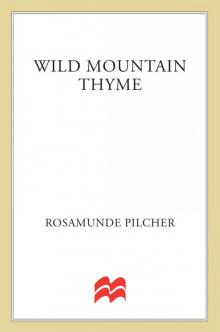 Wild Mountain Thyme
Wild Mountain Thyme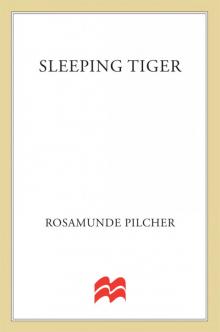 Sleeping Tiger
Sleeping Tiger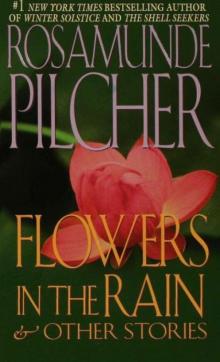 Flowers in the Rain & Other Stories
Flowers in the Rain & Other Stories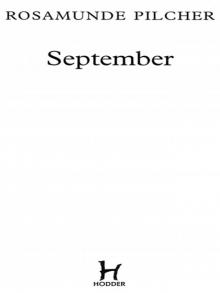 September
September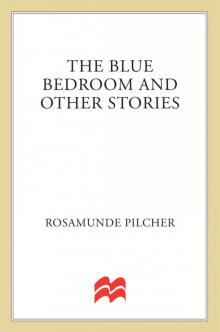 The Blue Bedroom: & Other Stories
The Blue Bedroom: & Other Stories The Carousel
The Carousel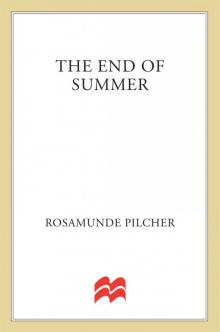 The End of Summer
The End of Summer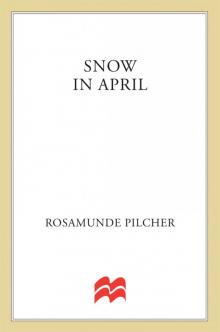 Snow in April
Snow in April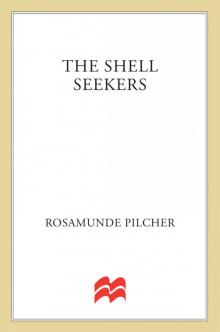 The Shell Seekers
The Shell Seekers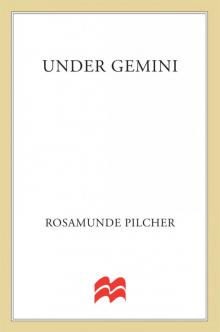 Under Gemini
Under Gemini The Empty House
The Empty House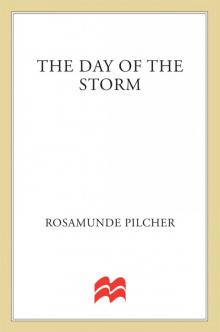 The Day of the Storm
The Day of the Storm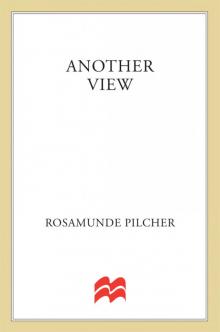 Another View
Another View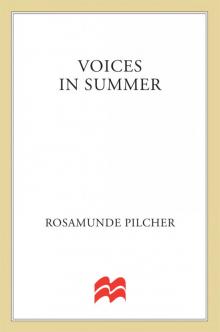 Voices in the Summer
Voices in the Summer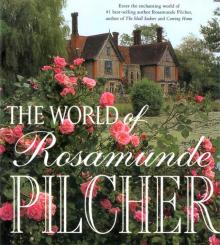 The World of Rosamunde Pilcher
The World of Rosamunde Pilcher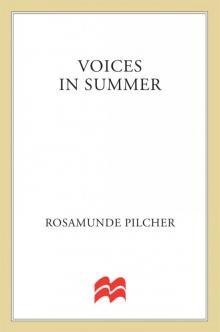 Voices In Summer
Voices In Summer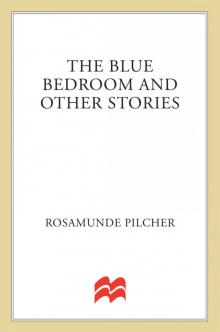 Blue Bedroom and Other Stories
Blue Bedroom and Other Stories